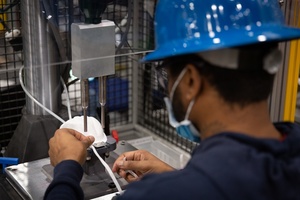New UK deals will bring millions more PPE items to frontline healthcare staff
Press release
Millions more visors, aprons and gowns will be delivered to frontline health and social care workers treating coronavirus patients, manufactured in response to the UK government’s call to arms.

- Four more companies answer government’s call to arms to manufacture PPE
- Millions more visors, aprons and gowns to be delivered over the next few months
- New contracts are part of the government’s ‘Make’ initiative to harness UK production power
As part of the government’s Make initiative to use the production power of the UK’s world-leading manufacturing sector, 4 new partnerships have been struck to rapidly produce and deliver PPE to frontline workers over the coming months.
The companies are:
-
Photocentric, who are using an innovative 3D printing method to produce visors in large quantities. They will be supplying over 7.6 million protective visors over the next 6 months, with plans to scale up to making 500,000 visors a day if required
-
Ramfoam will be manufacturing and delivering 3 million visors to the NHS per week. They are recruiting an additional 100 staff to ensure demand is met, scaling up to more than 160
-
Elite Plastics Ltd, who have adapted their production lines to produce large volumes of aprons. Starting this week, 20 million will be delivered to the NHS and social care sector per month
-
Macdonald and Taylor Healthcare Ltd, who have scaled up production of isolation gowns and scrubs, so far delivering 40,000 gowns a week for the last 2 months. They will now be providing an additional 50,000 gowns a week with government fabric for the next 6 months
Lord Paul Deighton, adviser to the Health Secretary on PPE, said:
The response from our manufacturing industry has been phenomenal and I can’t thank them enough for their continued efforts. Every health and care worker must have access to appropriate PPE and through this national effort we will ensure they do.
We have already struck deals with around 30 UK companies to manufacture PPE and over 100 suppliers to deliver items at scale and pace. We will continue to identify further opportunities to get more PPE to the frontline rapidly.
The government has delivered over 1.65 billion pieces of PPE to the frontline and deals have already been struck with around 30 companies, including Amazon, Royal Mail and Jaguar Land Rover, through the Make initiative to produce much-needed PPE.
We are also working with over 100 new suppliers to deliver at the scale and pace the UK requires.
- Photocentric, based in Peterborough, East of England, produces 3D printers and the polymer used to make printed parts to supply the dental and industrial prototyping sectors
- Ramfoam, based in Oldbury, West Midlands, produces expanded polyethylene-grade foams for the automotive, aerospace, leisure and healthcare sectors in the UK and internationally
- Elite Plastics, a company based in Hereford, West Midlands, produces polythene products like shrink film, food bags and mailing bags for the building, catering, automotive and retail sectors
- Macdonald and Taylor Healthcare, based in Warrington, North West, produce protective clothing for healthcare, chemical and nuclear industries, as well as patient care products and consumer healthcare products, like antibacterial wipes
Other examples of the contracts signed with UK based manufacturers include:
- The Royal Mint will be providing over 1.9 million face visors over the next 6 months, with 54,000 being delivered a week
- A partnership with Amazon allows us to harness their global sourcing expertise
- eBay has provided a new platform, jointly developed with Clipper Logistics, that will allow primary, social, and community care providers to order from a range of PPE directly – the orders are then fulfilled by Clipper and shipped directly via Royal Mail
- Honeywell will produce more than 70 million face masks, creating 450 new jobs
- Survitec, a survival technology company, will begin producing gowns as soon as the beginning of June
- DTR Medical will be providing 1.3 million visors, with the first delivery expected next week
- Bollé Safety, who manufacture protective eyewear, will make 6.5 million visors over the course of the pandemic
- Jaguar Land Rover is now manufacturing 14,000 visors a week for healthcare staff
- Don & Low will be manufacturing 12 million metres squared of fabric for gowns over the next six months, with the first delivery expected later this month
- Burberry is manufacturing non-surgical gowns at its factory in Castleford and sourcing masks through its supply chain. To date, the company has donated over 100,000 pieces of PPE to the NHS and healthcare charities
- Ineos is delivering around 50,000 bottles of hand sanitiser a week to NHS hospitals
Published 6 June 2020